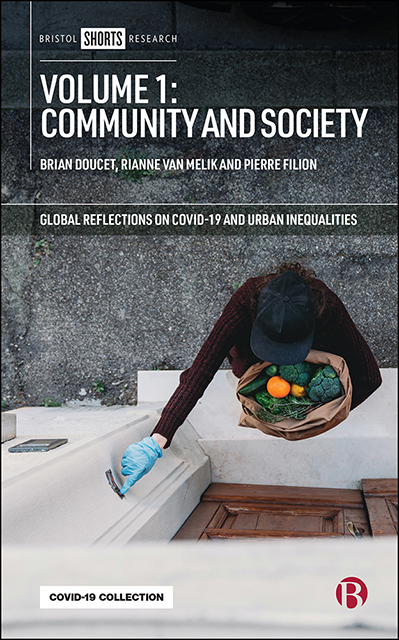Book contents
- Frontmatter
- Contents
- List of Figures and Tables
- Notes on Contributors
- Acknowledgments
- Preface to All Four Volumes of Global Reflections on COVID-19 and Urban Inequalities
- One Introduction
- Part I Working Practices
- Part II Life During Lockdown
- Part III Migration, Migrants, and Refugees
- Part IV Age, Race, Gender, and Ability
- Index
Fourteen - Spatial Inequality and Colonial Palimpsest in Kuala Lumpur
Published online by Cambridge University Press: 13 April 2023
- Frontmatter
- Contents
- List of Figures and Tables
- Notes on Contributors
- Acknowledgments
- Preface to All Four Volumes of Global Reflections on COVID-19 and Urban Inequalities
- One Introduction
- Part I Working Practices
- Part II Life During Lockdown
- Part III Migration, Migrants, and Refugees
- Part IV Age, Race, Gender, and Ability
- Index
Summary
Three weeks after armed military personnel started patrolling the area and barbed wire was installed around the perimeter, an immigration raid was conducted on Menara City One and Malayan and Selangor Mansions in Kuala Lumpur, Malaysia on May 1, 2020. The irony that the raid was conducted on Labor Day was not lost, given that the three buildings were mostly populated by migrant workers living in cramped conditions. Following a spike of COVID-19 cases in early April 2020, the three buildings were put under Enforced Movement Control Order (EMCO) – a stricter version of the lockdown imposed on the rest of the country. People were prohibited from entering or leaving the buildings. Hundreds of migrants and refugees, including children, were detained in the raid, despite the Defense Minister's promise in March that punitive actions would not be taken against undocumented migrants should they come forward to get tested (Sukumaran and Jaipragas, 2020).
Malaysia performed relatively well in managing the infection rate of COVID-19 during the first wave of the pandemic. By September 2020, Malaysia had a total of 9,915 cases resulting in 128 deaths (Ministry of Health, 2020). To mitigate the impact of the pandemic, several types of lockdown were imposed depending on the number of cases and the likelihood of infection. The Movement Control Order (MCO), imposed on the whole country from March 18 to May 4, 2020 was strict: nobody was allowed to leave their homes apart from essential reasons such as getting groceries or going to the doctor. There was no mandated outdoor exercise time. For about six weeks, most people did not leave their places of residence at all.
The immigration raid was yet another pandemic episode highlighting the inherent inequality in Malaysian society. As elsewhere, the plight of the urban poor was magnified (Qamhaieh, Chapter 2; Brooks, Chapter 5; Yea, Chapter 16; Xavier, Volume 2). The lockdown meant a loss of income given the nature of their jobs that could not be done remotely, while at the same time, their expenses would have increased, given the loss of access to affordable goods and services provided by the informal markets. This was compounded by their often-cramped living conditions, making it harder for students in the household to study and follow online lessons – if it was even possible in the first place (Megat Muzafar and Kunasekaran, 2020).
- Type
- Chapter
- Information
- Volume 1: Community and Society , pp. 155 - 164Publisher: Bristol University PressPrint publication year: 2021



